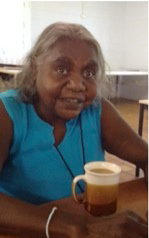You are here
Meeting with Joy Morlumbun
By Hannah Harper
 The Nungalinya College dining room is noisy with the percussion of tea cups, and chairs at afternoon tea time. Joy's eyes widen, and she pauses between phrases. She has been in classes all day, and this is the second week of her course here in Darwin. Still Joy finds some concentration for our discussion about language - a subject important enough to drown out the distractions of our setting. It's the first time we've met, and Joy has some stories to share.
The Nungalinya College dining room is noisy with the percussion of tea cups, and chairs at afternoon tea time. Joy's eyes widen, and she pauses between phrases. She has been in classes all day, and this is the second week of her course here in Darwin. Still Joy finds some concentration for our discussion about language - a subject important enough to drown out the distractions of our setting. It's the first time we've met, and Joy has some stories to share.
 "A few years ago, I went for a visit to the Institute of Aboriginal Studies (AIATSIS), I was doing a training course and I went to do research to look at all Worrorra documents and songs and sounds. That was the last time I really heard the sound of Worrorra - inside archives, at the Institute of Aboriginal Studies (AIATSIS)."
"A few years ago, I went for a visit to the Institute of Aboriginal Studies (AIATSIS), I was doing a training course and I went to do research to look at all Worrorra documents and songs and sounds. That was the last time I really heard the sound of Worrorra - inside archives, at the Institute of Aboriginal Studies (AIATSIS)."
"That brought me back to memories, in the church, where we involved children and the families, speaking the language. That was how Worrorra was introduced in the church. When I was small, the community leaders, the minister, he was opening the service in Worrorra. I grew up with the sound. It was in the setting of my family, in my home setting. Even if I went to another family, that was the word around, the sound. But today, there's nothing. Children are not using the language."
 Joy has copies of JRB Love's early work in Worrorra - the Gospels of Mark and Luke. In recent years, she has spent some time going over these translations. "When we were at Mowanjum, when Howard (Amery) brought the Worrorra things, that was when we started to do programs, like speaking it out. In the reading and worship, the songs and praises." Since Howard finished in the position of West Kimberley Project Officer in 2010, there have been few opportunities for the church in Mowanjum to continue work on language and Scripture resources. Joy mentions in passing that mining royalties and land claims have politicised the Worrorra language and kinship. It is becoming increasingly difficult for the elders to engage the
Joy has copies of JRB Love's early work in Worrorra - the Gospels of Mark and Luke. In recent years, she has spent some time going over these translations. "When we were at Mowanjum, when Howard (Amery) brought the Worrorra things, that was when we started to do programs, like speaking it out. In the reading and worship, the songs and praises." Since Howard finished in the position of West Kimberley Project Officer in 2010, there have been few opportunities for the church in Mowanjum to continue work on language and Scripture resources. Joy mentions in passing that mining royalties and land claims have politicised the Worrorra language and kinship. It is becoming increasingly difficult for the elders to engage the
youth. Joy emphasises language revitalisation and use: "It's got to be in the church."
I thank Joy for meeting me in these busy days away from her home country. As we walk to the sink to rinse dishes, we agree to stay in touch.
NRCC is now seeking to fill the position of West Kimberley Area Ministry Support Worker, based in Derby, and working with the Mowanjum community. As part of the role, the person will be supporting the Scripture work, so NRCC is seeking someone with some background in languages. On his recent visit to Mowanjum, Steve Orme, (NRCC Resource Worker) discussed the position with the elders. They expressed the need for support and encouragement, in the midst of many challenges for the small congregation.
While in West Kimberley, Steve Orme conducted the funeral for a grandson of Janet Oobagooma.
Please pray for the grieving family in Mowanjum.
Pray for the appointment of a West Kimberley Support Worker for Indigenous Christians in Derby/ Mowanjum.
Pray for Kimberley people of all ages in the context of linguistic diversity, and endangered languages.


